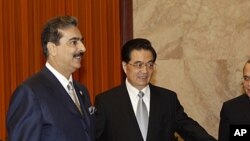Pakistan’s prime minister has met with Chinese President Hu Jintao in Beijing on the final day of a four-day trip aimed at promoting ties between the two nations. Yousuf Raza Gilani’s trip to China follows increased tensions between Pakistan and the United States.
President Hu Jintao congratulated Pakistani Prime Minister Yousuf Raza Gilani for a successful visit to China. He said the trip will take strategic cooperation between the two countries to a higher level.
Gilani said he feels proud and privileged to meet Hu, whom he referred to as a friend.
Media reports quoting Pakistani officials say China agreed to expedite delivery of 50 fighter jets to Pakistan. Pakistan's defense minister Ahmad Mukhtar said his country hopes to get the JF-17 planes within six months.
Chinese officials have not confirmed any new deals for military assistance with Pakistan. But Foreign Ministry spokeswoman Jiang Yu said the two countries signed several agreements on technology, finance and energy resources.
She says the two countries have set up what she described as “new plans of trade and economic cooperation,” with a focus on energy resources, infrastructure and agriculture.
She said the Chinese government also is encouraging Chinese enterprises to expand their investment in Pakistan and strengthen cooperation in trade, finance and technology.
Peking University associate professor of international studies, Dong Wang, says Chinese businesses have not invested much in Pakistan before because they see the South Asian nation as underdeveloped.
“Pakistan’s problem is that it’s economically so backward. It doesn’t have a very good economic base. It doesn’t have good infrastructure. It doesn’t have good industry. Basically, it doesn’t have a good economy. So, that has a lot to do with its own economic situation,” said Dong Wang.
Gilani’s trip to China closely follows the death of Osama bin Laden, who was killed by US troops inside Pakistan.
The U.S. operation has raised tensions between Pakistan and its largest donor, the United States. Some U.S. lawmakers are calling for significant cuts in aid to Pakistan.
Many analysts see Gilani’s visit as Islamabad’s opportunity to play-up its relationship with Beijing.
Andrew Small of the German Marshall Fund, a U.S. public policy organization, says the United States and China share the same goal of improving Pakistan’s stability. Therefore, he says, Chinese economic assistance to Pakistan is welcome.
At the same time, he says Beijing is not interested in working too closely with U.S. security and development efforts in South Asia.
"When the United States has proposed actual cooperation programs in Afghanistan or vis-a-vis Pakistan, China has been very reluctant to get involved and to operationalize any of the suggestions that have come from the U.S. side. They don't want to become a target and they are happy in some respects to free ride on the fact that the U.S. faces all of the opposition from publics in Afghanistan and in Pakistan,” said Andrew Small.
China says that Gilani’s trip had been planned weeks in advance as part of events marking the 60th anniversary of diplomatic relations between the two countries.
China, Pakistan Tout Close Relations




